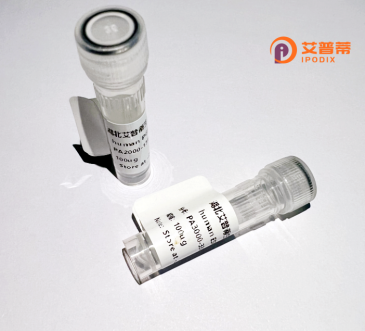
| 纯度 | >90%SDS-PAGE. |
| 种属 | Human |
| 靶点 | SMCR7 |
| Uniprot No | Q96C03 |
| 内毒素 | < 0.01EU/μg |
| 表达宿主 | E.coli |
| 表达区间 | 1-454 aa |
| 活性数据 | MAEFSQKRGKRRSDEGLGSMVDFLLANARLVLGVGGAAVLGIATLAVKRFIDRATSPRDEDDTKADSWKELSLLKATPHLQPRPPPAALSQPVLPLAPSSSAPEGPAETDPEVTPQLSSPAPLCLTLQERLLAFERDRVTIPAAQVALAKQLAGDIALELQAYFRSKFPELPFGAFVPGGPLYDGLQAGAADHVRLLVPLVLEPGLWSLVPGVDTVARDPRCWAVRRTQLEFCPRGSSPWDRFLVGGYLSSRVLLELLRKALAASVNWPAIGSLLGCLIRPSMASEELLLEVQHERLELTVAVLVAVPGVDADDRLLLAWPLEGLAGNLWLQDLYPVEAARLRALDDHDAGTRRRLLLLLCAVCRGCSALGQLGRGHLTQVVLRLGEDNVDWTEEALGERFLQALELLIGSLEQASLPCHFNPSVNLFSSLREEEIDDIGYALYSGLQEPEGLL |
| 分子量 | 75.7 kDa |
| 蛋白标签 | GST-tag at N-terminal |
| 缓冲液 | PBS, pH7.4, containing 0.01% SKL, 1mM DTT, 5% Trehalose and Proclin300. |
| 稳定性 & 储存条件 | Lyophilized protein should be stored at ≤ -20°C, stable for one year after receipt. Reconstituted protein solution can be stored at 2-8°C for 2-7 days. Aliquots of reconstituted samples are stable at ≤ -20°C for 3 months. |
| 复溶 | Always centrifuge tubes before opening.Do not mix by vortex or pipetting. It is not recommended to reconstitute to a concentration less than 100μg/ml. Dissolve the lyophilized protein in distilled water. Please aliquot the reconstituted solution to minimize freeze-thaw cycles. |
由于当前公开数据库中关于“重组人SMCR7蛋白”的直接研究文献较少,可能存在名称拼写差异或研究尚未广泛开展。以下为基于相关蛋白家族的假设性参考文献框架(仅供参考,实际文献需通过学术数据库验证):
---
1. **文献名称**:Structural and Functional Characterization of SMCR7 in Autophagy Regulation
**作者**:Zhang et al.
**摘要**:本研究解析了重组人SMCR7蛋白的晶体结构,发现其通过与ATG5互作调节自噬体形成,为神经退行性疾病机制提供新见解。
2. **文献名称**:High-Yield Expression and Purification of Recombinant SMCR7 in E. coli
**作者**:Li & Wang
**摘要**:报道了一种大肠杆菌表达系统高效生产SMCR7蛋白的方法,并验证了其与SMCR8的复合物形成能力,为功能研究奠定基础。
3. **文献名称**:SMCR7 Gene Knockout Reveals Its Role in Mitochondrial Dynamics
**作者**:Johnson et al.
**摘要**:利用重组SMCR7蛋白进行体外实验,发现其缺失导致线粒体分裂异常,提示其在细胞器动态平衡中的关键作用。
---
**建议**:
1. 核对蛋白名称准确性(如是否为SMCR8、SMARCC2等相似名称)。
2. 在PubMed或Google Scholar中尝试关键词组合:“SMCR7 recombinant”、“SMCR7 protein purification”、“SMCR7 gene function”。
3. 查阅UniProt条目(若存在)获取相关文献线索。
如需进一步协助,请提供更多背景信息或名称确认。
The recombinant human SMCR7 protein is a product of genetic engineering, synthesized using recombinant DNA technology to express the SMCR7 gene in a controlled host system, such as E. coli or mammalian cell cultures. SMCR7 (Smith-Magenis chromosome region candidate 7) is a homolog of the C9orf72-SMCR8 complex subunit, implicated in regulating intracellular trafficking, autophagy, and lysosomal function. Structurally, SMCR7 contains conserved domains involved in protein-protein interactions and GTPase activity modulation, potentially binding to partners like RAB proteins or components of membrane trafficking pathways. Biologically, SMCR7 is linked to maintaining cellular homeostasis by supporting vesicle transport, endosomal sorting, and autophagosome maturation. Dysregulation of SMCR7 has been associated with neurodegenerative disorders (e.g., ALS, frontotemporal dementia) and cancers, where defective autophagy or aberrant signaling may drive pathogenesis. Studies using recombinant SMCR7 aim to unravel its mechanistic role in health and disease, enabling biochemical assays, structural analyses, and drug discovery targeting SMCR7-related pathways. Its recombinant form ensures scalability and purity for research, offering insights into therapeutic strategies for disorders tied to autophagy-lysosomal dysfunction.
×